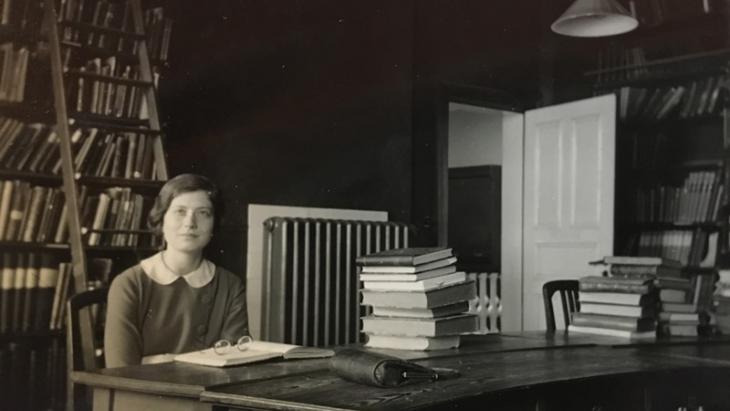Defining tyranny: Hitler, a dictionary and the death of a Jewish Arabist
By Khaled Diab
The world's best-known Arabic dictionary started off as a Nazi propaganda project and cost a young Jewish scholar her life. It's time Hedwig Klein received the posthumous recognition she deserves.

Thursday 30 July 2020
Dictionaries are like the librarians of books. They have a reputation for being mild, polite and impartial. Unlike, say, novels or political tomes, nobody would expect a dictionary to be political, much less controversial.
But there is a dictionary that is both.
Hans Wehr, the world's most renowned dictionary of modern Arabic usage, is the constant companion of foreign students of Arabic and Arabists.
However, this learning aid that has helped generations of Arabists has a dark and disturbing history that few are aware of and shocked me and other users of this reference work when they learned about it. The venerable dictionary started out as a Nazi project and it gave a young Jewish scholar a stay of execution but only for the time she worked on it.
Although the dictionary only saw the light of day in the early 1950s, work on it began in the 1930s, under the auspices of the Nazi regime, which entertained the vain hope of producing a high-quality Arabic translation of Adolf Hitler's Mein Kampf (My Struggle).
Frustrated by the quality of the available translations of Hitler's opus, the German foreign office learned about the project of the Arabist Hans Wehr (after whom the dictionary is named) to painstakingly and meticulously compile a dictionary based on actual modern usage of Arabic rather than the more conventional classical sources.
Such a resource would be useful, the Nazi propaganda machine reasoned, in the so-far futile efforts to produce an official translation of Hitler's autobiography and manifesto.
Part of the problem lay in the fact that the Arabs who had attempted to translate Mein Kampf had been hobbyists who did not know German and relied on the French or English translation.
Another challenge, but one unlikely to have been recognised or admitted by the Nazi authorities, was the poor quality of the original text. Reflecting the mediocrity of Hitler's evil, Mein Kampf was so spectacularly bad that even fellow fascists derided the memoir. It was mocked as “a boring tome that I have never been able to read… [full of] little more than commonplace clichés,” by Benito Mussolini, according to the biography of the Italian fascist dictator written by Denis Mack Smith.
Ironically, Wehr received invaluable assistance in this propaganda project from an unlikely source, a young and talented Jewish Arabist by the name of Hedwig Klein, an Islamic studies scholar who did not receive the PhD she had worked so hard towards due to Nazi race laws (a fascinating biography of Klein is available here).
At the time, surprising as it may seem today, interest in Islam and the Arabs was in vogue amongst Jewish intellectuals in Europe, who peered eastward in the hope of finding salvation from anti-Semitism, with many believing that there was a natural affinity between Judaism and Islam.
After having unsuccessfully attempted to flee Nazi Germany for British-occupied India, Klein's last, desperate hope to escape Hitler's Final Solution was to work on Wehr's dictionary.
The knowledgeable young scholar, whose modest ambition had once been to become an academic librarian, set to work voraciously reading modern Arabic literature and noting down the words used and their meanings.
The quality of her entries received high praise from Wehr's team but one member noted that “it will be completely impossible for her to be credited as a contributor later”.
One can only begin to imagine the conflicted emotions, not to mention fear, which Klein experienced. It must have felt like a cruel blow of fate for a young Jew who had been stripped of her rights and her academic credentials to work on an academic project whose ultimate aim was to glorify her tormentor, the “Führer” of Aryan supremacy, in order to avoid being deported to a death camp.
Ultimately, her efforts were in vain, buying her no more than a year. On 11 July 1942, Hedwig Klein was deported to Auschwitz where she perished.
After the war, Klein was posthumously recognised as a Doctor of Philosophy.
Fortunately for humanity, no authorised Arabic translation of Mein Kampf appeared – though unofficial translations are available in numerous bookshops in the Arab world.
As for Hans Wehr, he finished his dictionary as the war was ending, in 1945. He managed to get past the post-war denazification process by claiming to have “managed to save a Jewish academic colleague… by requesting that the Gestapo release her for work supposedly important to the war effort”.
By doing so, Wehr exploited Hedwig Klein twice over: once to profit from her labours before she was exterminated and a second time to abuse her memory to evade punishment for his Nazi past.
Although Wehr thanks Klein amongst other contributors in the foreword to his dictionary, which was finally published in 1952, he makes no mention of what her contribution to his work was nor of her murder at Auschwitz.
This whitewashing of history must end. Future editions of the dictionary must include the full story of Hedwig Klein and of the Nazi propaganda machine's backing of this dictionary project.
And just as Klein was posthumously awarded her PhD, she should receive belated credit for the dictionary that failed to save her and for which she ultimately gave her life.
From now on, the world's foremost dictionary of modern Arabic should be renamed Klein-Wehr.


